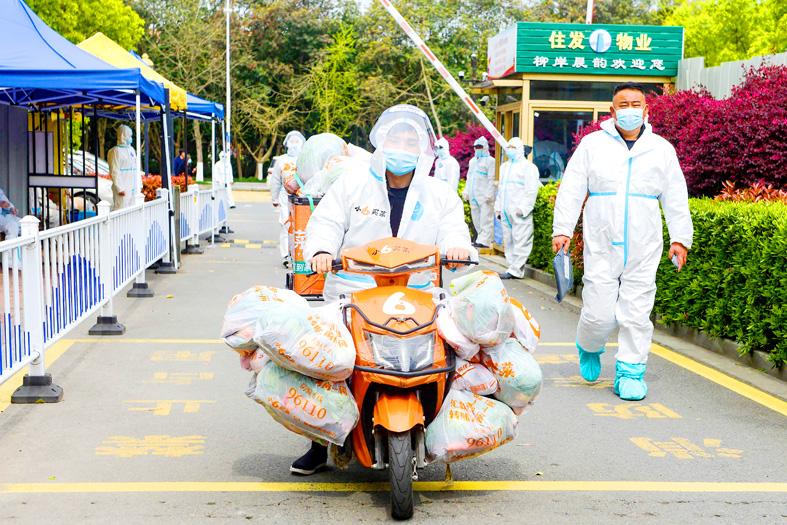China yesterday reported 13,146 COVID-19 cases, the most since the peak of the first wave more than two years ago, as health officials said they have found a suspected new subtype of the Omicron variant of SARS-CoV-2 in the Shanghai area.
China’s “zero COVID” strategy is under extreme pressure as the virus whips across the country. Until last month, China had successfully kept its daily caseload down to double or triple digits, with hard, localized lockdowns, mass testing and travel restrictions.
However, cases have in the past few weeks surged to thousands each day, especially in the outbreak epicenter of Shanghai, where streets were eerily empty yesterday as 25 million people stayed indoors under lockdown orders.

Photo: AFP
Officials in Suzhou, a city 30 minutes west of Shanghai, have detected a mutation of the Omicron variant not found in local or international databases, state media reported.
“This means a new variant of Omicron has been discovered locally,” Xinhua news agency said, citing Suzhou Center for Disease Control and Prevention Deputy Director Zhang Jun (張鈞).
The outbreak is also testing the patience of Chinese toward tough restrictions, at a time when much of the world has reopened.
The 1.5 million residents of Baicheng in northeast China yesterday joined the ranks of tens of millions of other Chinese who have endured some form of lockdown over the last month, disrupting work and damaging the economy.
China recorded 13,146 cases yesterday, the Chinese National Health Commission said in a statement, with “no new deaths” reported.
It is the country’s highest daily infection tally since the middle of February 2020.
Nearly 70 percent of China’s caseload was in Shanghai, after mass testing, the commission said.

People can preregister to receive their NT$10,000 (US$325) cash distributed from the central government on Nov. 5 after President William Lai (賴清德) yesterday signed the Special Budget for Strengthening Economic, Social and National Security Resilience, the Executive Yuan told a news conference last night. The special budget, passed by the Legislative Yuan on Friday last week with a cash handout budget of NT$236 billion, was officially submitted to the Executive Yuan and the Presidential Office yesterday afternoon. People can register through the official Web site at https://10000.gov.tw to have the funds deposited into their bank accounts, withdraw the funds at automated teller

PEACE AND STABILITY: Maintaining the cross-strait ‘status quo’ has long been the government’s position, the Ministry of Foreign Affairs said Taiwan is committed to maintaining the cross-strait “status quo” and seeks no escalation of tensions, the Ministry of Foreign Affairs (MOFA) said yesterday, rebutting a Time magazine opinion piece that described President William Lai (賴清德) as a “reckless leader.” The article, titled “The US Must Beware of Taiwan’s Reckless Leader,” was written by Lyle Goldstein, director of the Asia Program at the Washington-based Defense Priorities think tank. Goldstein wrote that Taiwan is “the world’s most dangerous flashpoint” amid ongoing conflicts in the Middle East and Russia’s invasion of Ukraine. He said that the situation in the Taiwan Strait has become less stable

CONCESSION: A Shin Kong official said that the firm was ‘willing to contribute’ to the nation, as the move would enable Nvidia Crop to build its headquarters in Taiwan Shin Kong Life Insurance Co (新光人壽) yesterday said it would relinquish land-use rights, or known as surface rights, for two plots in Taipei’s Beitou District (北投), paving the way for Nvidia Corp to expand its office footprint in Taiwan. The insurer said it made the decision “in the interest of the nation’s greater good” and would not seek compensation from taxpayers for potential future losses, calling the move a gesture to resolve a months-long impasse among the insurer, the Taipei City Government and the US chip giant. “The decision was made on the condition that the Taipei City Government reimburses the related

FRESH LOOK: A committee would gather expert and public input on the themes and visual motifs that would appear on the notes, the central bank governor said The central bank has launched a comprehensive redesign of New Taiwan dollar banknotes to enhance anti-counterfeiting measures, improve accessibility and align the bills with global sustainability standards, Governor Yang Chin-long (楊金龍) told a meeting of the legislature’s Finance Committee yesterday. The overhaul would affect all five denominations — NT$100, NT$200, NT$500, NT$1,000 and NT$2,000 notes — but not coins, Yang said. It would be the first major update to the banknotes in 24 years, as the current series, introduced in 2001, has remained in circulation amid rapid advances in printing technology and security standards. “Updating the notes is essential to safeguard the integrity